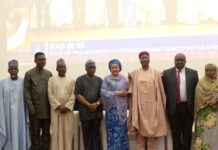
By Cecilia Ologunagba
Women Affairs Pauline Tallen says the Federal Government is re-engineering its existing structure by spearheading a new agenda for Nigerian women, towards the quest for women’s political participation ahead of the 2023 general elections.
Tallen told the News Agency of Nigeria (NAN) in New York on sideline of the ongoing 66th Session of the Commission on the Status of Women (CSW) that the government would soon inaugurate a “Women Reconnect Initiative” to achieve the purpose.
The minister said the initiative will address some of the emerging issues affecting the growth and development of women in Nigeria, particularly in political and economic sphere.
“In a few weeks, we will flag off a National Women’s Movement under the name Women Reconnect for New Nigeria Initiative (WR4NNI).
“It is proposed as a social mobilisation and sensitisation movement to galvanise women to participate fully and equitably in the processes leading up to the 2023 general elections and beyond,’’ she said.
According to her, through the process, the country will re-engineer existing structures put in place by the Federal Ministry of Women Affairs.
“These existing structures include the G-100 Women Lobby Group, the Nigeria Women Trust Fund, the 6 Zonal Women Political Offices spread across the zones to make them more responsive.
“We are looking for development partners and donor communities to support us change the narratives for our women come 2023.
“Also, Social Protection Policy is being reviewed, Domestication of outstanding International instruments Gender Equality, Amendment of the constitution, Harmonisation of gender equity issues, Institutionalization of Regional Affirmative action 50:50; The Africa we want.”
Tallen, however, noted that despite inclusive policies, Nigeria has a long road to gender inequality with records of deaths, poverty and political disenfranchisement prevalent for women.
Other emerging issues affecting the growth and development of women in Nigeria, she said were rejection of the 5 Gender Inclusion Bills by the National Assembly.
“Negative Impact of Covid-19 on women e.g increased in Gender Based Violence, nearly 90 million Nigerians experience extreme poverty and 70 per cent of that population that lives in extreme poverty are women and girls.
“While women accounted for most of Nigeria’s agricultural workforce, they represent only 13 per cent of agricultural landowners.
’’In addition, she said political exclusion and education parity were some other gender issues experienced by Nigerian women.
Tallen told NAN that the Nigerian government was following up on the domestication of the Violence Against Persons (Prohibition) Act in remaining states across the country.
“The government is also following the He4She project; developing of a National Policy on Women Economic Empowerment as well as developing legislation and frameworks to guide 35 per cent affirmative action in the country.
“The Government is developing framework to guide 35 per cent affirmative action, especially with the ongoing Constitution review at the National Assembly.
“The review will include among several other gender sensitive legislations in terms of Affirmative action, indigenship, issues of human rights among several others.
“Also, the ministry’s high level advocacy to the three tiers of Governance towards ensuring that Nigerian Women get their rightful place in the scheme of National Development.
“We are in the verge of putting in place a strategic Women’s movement which can harness previous efforts and galvanize action towards spearheading a new agenda for Nigerian women, towards our quest for women’s political participation,” she said.
The minister, however said Nigeria had been rated scored high based on implementation of some of the international and regional protocols on gender policy development.
“A critical evaluation recently of environment, climate change and gender policy development scored Nigeria high with respect to having in place legal frameworks.
“Legal frameworks that promote, enforce, and monitor gender equality, to guarantee inclusivity of all groups in the formulation and implementation of climate change initiatives, programmes, and policies in the country,’’ she said. (NAN)



